Unit1 重难点解析 - 我改
九年级英语上学期Unit1重难点分析

九年级英语上学期Unit1重难点分析引言九年级英语上学期的Unit1是学生们的新起点,它是整个学期的开篇单元。
这个单元主要涉及一些基础的语法知识和词汇,以及阅读和写作技巧的提升。
本文将对此单元的重难点进行分析,并给出相应的学习建议,希望能为学生们的学习提供一些帮助。
重点一:一般过去时在Unit1中,学生将学习一般过去时的用法。
一般过去时表示过去发生的动作或存在的状态,它的构成是动词的过去式。
例如:“I played basketball yesterday.”(我昨天打篮球。
)这一部分的重点在于学生们掌握一般过去时的构成形式以及正确使用时态符号。
学生们可以通过大量的阅读和写作练习来巩固这个知识点。
重点二:词汇积累Unit1中涉及的词汇相对较多,包括名词、动词、形容词等。
学生们需要掌握这些词汇的读音、词义以及用法。
他们可以通过默写、记忆卡片和词汇游戏等方式来巩固词汇。
另外,建议学生们使用这些词汇进行句子的构造和写作练习,以便更好地理解和运用这些词汇。
重点三:阅读理解与写作在Unit1中,学生们将进行一些阅读理解和写作练习。
阅读理解部分要求学生们从文章中获取关键信息,并回答问题。
写作部分要求学生们根据提示写出一段短文。
这一部分的重点在于学生们理解文章的主题和细节,并能够用正确的语言表达出来。
建议学生们多做阅读理解和写作练习,培养自己的阅读和写作能力。
难点一:一般过去时和现在完成时的区别在Unit1中,学生们将学习一般过去时和现在完成时的区别。
一般过去时表示过去发生的动作或存在的状态,而现在完成时表示过去发生的动作对现在产生的影响或结果。
例如:“I went to Paris last year.”(我去年去了巴黎。
)和“I have been to Paris.”(我去过巴黎。
)这一部分的难点在于学生们准确理解和使用这两个时态。
建议学生们通过对比这两个时态的句子进行练习,以加深对它们的理解。
难点二:定语从句Unit1中的写作部分要求学生们使用定语从句来扩展句子。
Unit 1 Topic 1 重难点知识归纳总结2021-2022学年仁爱版英语七年级上册

Unit 1 Making new friendsTopic 1 Welcome to China!【重点单词】1.good [ɡud] adj. 好的;令人愉快的2.morning [ˈmɔ:niŋ] n. 早晨;上午3.I [ai] pron. 我4.am [æm] v. 是5.welcome [ˈwɛlkəm] interj. & v. 欢迎6.to /tə;tu/ prep. 到,对,向;在……之前(动词不定式符号,无词义)7.China [ˈtʃaɪnə] n. 中国8.thank [θæŋk] v. 谢谢,感谢9.you [ju] pron. 你;您;你们10.the [ðə; ði] art. 这(那)个,这(那)些11.the USA [ˌjuː es ˈeɪ] = the United States of America 美国;美利坚合众国12.the UK [ˌjuː ˈkeɪ] = the United Kingdom 英国,联合王国(包括大不列颠及北爱尔兰)13.hello [heˈləu] interj. 喂,你好14.are [ɑ:] v. 是15.yes [jes] adv. 是,同意16.no [nəu] interj. 不;不是det. 没有,无17.not [nɔt] adv. 不;没有18.oh [əʊ] interj. 哦;啊19.nice [nais] adj. 令人愉快的;友好的20.meet [mi:t] v. 结识;遇见21.too [tu:] adv. 也;太;很22.hi [hai] interj. 喂23.thanks [θæŋks] interj. & n. 感谢;谢谢24.Mr. =mister /ˈmɪstər/ n. 先生25.see [si:] v. 遇见;看到;明白26.mom [mɔm] (mum [mʌm] BrE)n. 妈妈27.this [ðɪs ] pron. & det. 这,这个28.is [ɪz] v. 是29.my [maɪ] det. 我的30.teacher [ˈti:tʃə] n. 老师,教师31.how [hau] adv. 怎样;多少;多么32.do [du] v. aux. 构成否定句、疑问句的助动词,无词义v. 做33.dad [dæd] n. 爸爸34.Miss [mis] n. 女士;小姐35.Ms. /miz/ n. 女士36.afternoon [ˌɑ:ftəˈnu:n] n. 下午37.goodbye [ˌɡudˈbai] interj. 再见38.bye [baɪ] interj. 再见39.fine [fain] adj. 健康的;晴朗的40.and [ænd, ənd] conj. 和41.OK /əʊ'keɪ/ adj. (口语)安然无恙interj. 好,行42.here /hɪr/ adv. 在这里【重点短语】1.Good morning. 早上好2.Welcome to... 欢迎来到……3.Thank you. 谢谢。
外研版英语八年级上册Module 1 Unit1 课文重难点同步解读
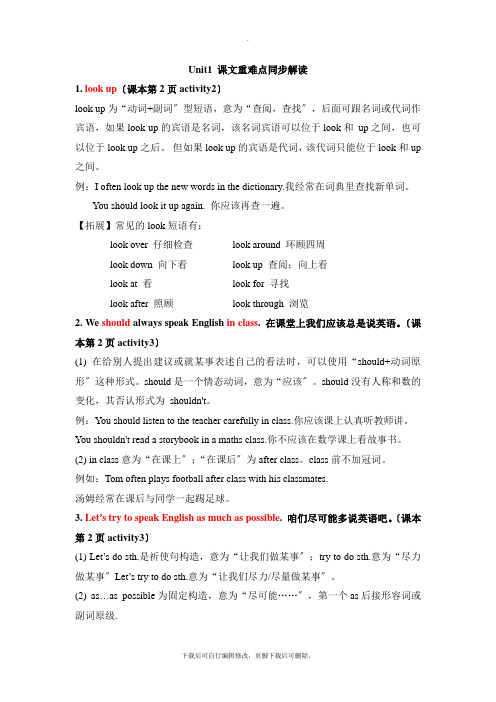
Unit1 课文重难点同步解读1. look up〔课本第2页activity2〕look up为“动词+副词〞型短语,意为“查阅,查找〞,后面可跟名词或代词作宾语,如果look up的宾语是名词,该名词宾语可以位于look和up之间,也可以位于look up之后。
但如果look up的宾语是代词,该代词只能位于look和up 之间。
例:I often look up the new words in the dictionary.我经常在词典里查找新单词。
You should look it up again. 你应该再查一遍。
【拓展】常见的look短语有:look over 仔细检查look around 环顾四周look down 向下看look up 查阅;向上看look at 看look for 寻找look after 照顾look through 浏览2. We should always speak English in class. 在课堂上我们应该总是说英语。
〔课本第2页activity3〕(1) 在给别人提出建议或就某事表述自己的看法时,可以使用“should+动词原形〞这种形式。
should是一个情态动词,意为“应该〞。
should没有人称和数的变化,其否认形式为shouldn't。
例:You should listen to the teacher carefully in class.你应该课上认真听教师讲。
You shouldn't read a storybook in a maths class.你不应该在数学课上看故事书。
(2) in class意为“在课上〞;“在课后〞为after class。
class前不加冠词。
例如:Tom often plays football after class with his classmates.汤姆经常在课后与同学一起踢足球。
七年级上Unit 1重难点解析

七年级上Unit 1重难点解析重点句型1.“What’s your name?”“My name is Gina.”“你叫什么名字?”“我叫吉娜。
”两人初次见面互相询问姓名时可用这个句型。
如想反问时可说:And you?或者And what’s your name? 如:A:Hello. What’s your name?B:My name is Ann Read. And you?/And what’s your name?A:I’m Han Mei.2.Hello!你好!Hello一般可作为熟人、朋友、青年人之间的招呼用语,语气较随便,译为“您好”;此外打电话或遇熟人时也可用。
译为“喂”。
在表示问候或唤起注意时,有时可用Hi来代替Hello,显得更为随便。
如:A:Hello/Hi,Jane!你好,简!B:Hello/Hi,Jim!你好,吉姆!3.-What’s your phone number?你的电话号码是多少?-It’s 2842942. 2842942。
(1)这一句型同我们学过的What’s your name?属同一类句型,前者是询问电话号码是多少,后者是询问某人叫什么名字,但都用What表示问“什么”的词放在句首来提问,这种疑问句叫特殊疑问句。
它的回答是针对特殊疑问词来回答的,不能用“是”或“不是”来回答。
因此对该句的回答是针对所问的内容(phone number)来具体回答的,回答是2842942。
注意回答时用It指代上文的phone number,以免重复。
(2)What’s…number?是用来对自行车牌号、房间号、电话号码、身份证号码等进行提问的,答语是It’s+号码。
此外还有另一种提问方式:What’s the numb er of…?如:What’s the number of your telephone?你的电话号码是多少?语法辨析1.hello与hi(1) hello与hi可以互换,都表示“喂,你好”。
牛津英语模块一Unit 1 重难点解析1

牛津英语模块一Unit 1 重难点解析1. What is your dream school like?你理想的学校是什么样的?理想学校:one’s dream school 或one’s ideal schoolbe like和look like的辨析:--- What is Tom like? 汤姆这人怎么样?--- What does Tom look like? 汤姆长得怎么样?--- He is kind and helpful. (内在本质)--- He is very handsome(英俊的).(外表长相)2. What did Wei Hua think of her life in the UK? 魏华认为她的英国生活怎么样?询问对方观点常用的表达有:What do you think of …? What do you find about…?How do you like….? What’s your opinion about…?3. Going to a British high school for one year was a very enjoyable and exciting experience for me.(1)动名词作主语是十分常见的语法现象。
但动名词既有主动形式:v-ing,也有被动形式:being done,要区别对待,灵活使用。
举例说明:Walking after meals is a good habit. 饭后散步是个好习惯。
Being praised by the class teacher made him very proud. 被班主任表扬让他很自豪。
(2)experience 可数名词时,表示“经历”,不可数时意思是“经验”。
experienced是形容词,意为“有经验的”。
He told us about his funny experiences in Africa. 他给我们讲述了在非洲时候的有趣经历。
Unit1重难知识点(复习讲义)-三年级英语上册单元速记·巧练(人教PEP版)
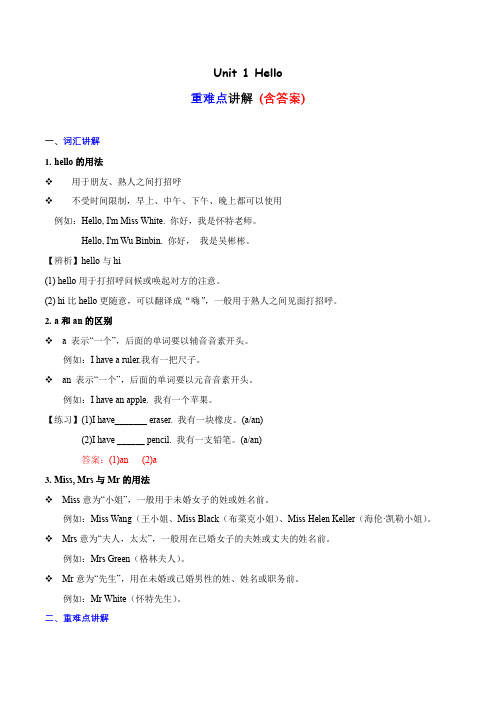
Unit 1 Hello重难点讲解(含答案)一、词汇讲解1.hello的用法❖用于朋友、熟人之间打招呼❖不受时间限制,早上、中午、下午、晚上都可以使用例如:Hello, I'm Miss White. 你好,我是怀特老师。
Hello, I'm Wu Binbin. 你好,我是吴彬彬。
【辨析】hello与hi(1) hello用于打招呼问候或唤起对方的注意。
(2) hi比hello更随意,可以翻译成“嗨”,一般用于熟人之间见面打招呼。
2.a和an的区别❖ a 表示“一个”,后面的单词要以辅音音素开头。
例如:I have a ruler.我有一把尺子。
❖an 表示“一个”,后面的单词要以元音音素开头。
例如:I have an apple. 我有一个苹果。
【练习】(1)I have_______ eraser. 我有一块橡皮。
(a/an)(2)I have ______ pencil. 我有一支铅笔。
(a/an)答案:(1)an (2)a3.Miss, Mrs与Mr的用法❖Miss意为“小姐”,一般用于未婚女子的姓或姓名前。
例如:Miss Wang(王小姐、Miss Black(布菜克小姐)、Miss Helen Keller(海伦·凯勒小姐)。
❖Mrs意为“夫人,太太”,一般用在已婚女子的夫姓或丈夫的姓名前。
例如:Mrs Green(格林夫人)。
❖Mr意为“先生”,用在未婚或已婚男性的姓、姓名或职务前。
例如:Mr White(怀特先生)。
二、重难点讲解1.向别人进行自我介绍的句型—I’m ...例如:Hello, I’m Miss White. 你好,我是怀特小姐。
句型结构:I’m + 姓名或其他情况(Amy, tall, seven ...).【重点解析】❖在向别人进行自我介绍时,经常会用到“I’m …” 句型。
I’m是I am的缩写,意为“我是”。
I作为单词讲意思是“我”,是第一人称单数;am是系动词,意为“是”。
最新】人教版七年级英语下册课文重难点讲解unit1
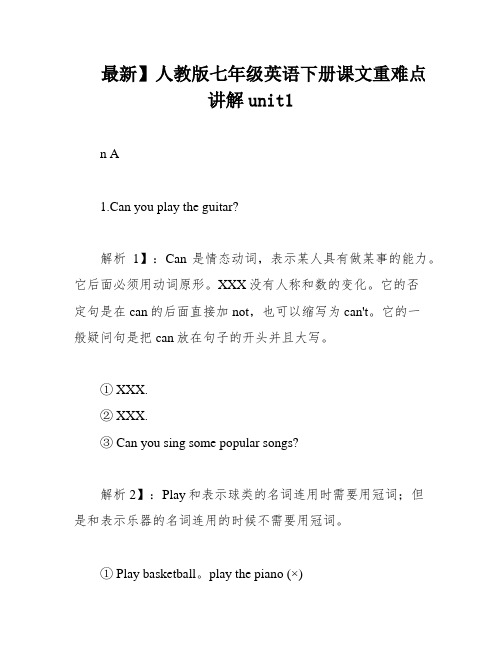
最新】人教版七年级英语下册课文重难点讲解unit1n A1.Can you play the guitar?解析1】:Can是情态动词,表示某人具有做某事的能力。
它后面必须用动词原形。
XXX没有人称和数的变化。
它的否定句是在can的后面直接加not,也可以缩写为can't。
它的一般疑问句是把can放在句子的开头并且大写。
① XXX.② XXX.③ Can you sing some popular songs?解析2】:Play和表示球类的名词连用时需要用冠词;但是和表示乐器的名词连用的时候不需要用冠词。
① Play basketball。
play the piano (×)② My little sister can't swim now。
but she can XXX.③ Lily is an active girl and she is XXX.2."What club do you want to join?" "I want to join the art club."解析1】:句型What+名词+一般疑问句?可以提问人物的身份、姓名、内容、性质和类别,也可以提问事物的目的、价格、数量和效果。
1.你在哪个班级?2.你的自行车是什么颜色?3.你想买什么尺码的?4.你想加入哪个俱乐部?1.请问你是哪个班的学生?2.你的自行车是什么颜色?3.你想购买哪个尺码的商品?4.你有意向加入哪个俱乐部?Marry XXX related to it。
She has a choice een the music club。
art club。
tennis club。
and sports club。
In response to the n "Can you speak English?"。
the answer is "Yes。
四年级小学英语人教版下册Unit 1复习课重难点解析

四年级下册第一单元Unit1 My school复习课重难点解析
一、重难点分析
本单元学习的主题是学校教室、场馆名称及相应位置。
引导学生通过看学校模型讨论教室、场馆的情景来综合运用本单元的核心词汇和句型:Where is …? It’s on the first/ second floor. Is this/ that…? Yes, it is. / No, it isn’t. Do you have a…?在教学过程中,紧密结合当下实情,围绕my school这一主题设计合理的场景展开任务和活动,让学生在切合实际的情境中表达语言、感受语言、理解语言,从而习得语言。
二、难点突破
【难点突破1】综合运用本单元的句型对学校场所位置进行自由交流的能力。
方法:教师通过引入一位新同学Crystal,她不熟悉学校环境,碰到认路的
麻烦来展开一系列的活动。
先后完成“listen and choose”、“fill in the blanks”、“read in roles”、“continue the dialogue”等任务,达到对学生听、说、认读等方面的锻炼的意图,让学生们在各项任务中大量输出语言,达到综合运用本单元核心句型的目的。
【难点突破2】含字母组合er发音的语音例词的拼读和拼写
方法:通过设计学生喜闻乐见的游戏形式——“放风筝”和“快乐碰碰车”,帮助学生复习含字母组合er发音的语音例词和运用语音知识拓展新词,并通过“listen and write”环节,检测学生根据语音知识达到拼写出单词的能力。
新五年级上Unit 1-8重难点

Unit 1重难点一、易错单词foresthouse与horse混淆afraid ------be afraid ofbeside 近义词nearbetween 在两者之间soup汤不可数名词区别于soap肥皂hard硬的-----soft 软的(区别于sofa)bear与dear/hear/year/pear混淆house/home/family之间的区别二、易错词组1.in front of (在外部的前面)in the front of (在内部的前面)拓展内容:next to 在…..旁边Inside在….里面反义词outsidebeside 在….旁边besides除了….之外2.just right 刚刚好3.wake up 醒来get up 起床4.in the kitchen 在厨房注意kitchen拼写5.put on your coats 穿上你们的外套6.be popular in 在某地流行注意拼写7.Western countries 西方国家注意拼写8.in the fridge 在冰箱里注意拼写9.find their cousin找到他们的堂弟三、语法there be 结构:就近原则be动词用法口诀:我用am,你用are,is跟着他、她、它,其他复数也用are.1.陈述句:There is a …There are some/ many/ a lot of…2.一般疑问句:Is there a…? yes,there is. No, there isn’t.Are there any…? Yes, there are. No, there aren’t.3.否定句:There isn’t…There aren’t any…4.问什么地方有什么东西:What’s in/on/near/under/beside/behind…?5.就近原则Be 动词根据靠的近的名词来确定。
Unit1重难点知识总结人教版九年级英语全册

Unit 1 How can we bee good learners?重点知识总结重点词汇:1.patient(1)patient作形容词,意为“有耐心的”。
常用短语:①be patient of sth.“忍耐某事”②be patient with sb.“对某人有耐心”●Linda has been quite patient of the noise for a week.Linda已经忍耐这个噪音一周了。
●Our chemistry teacher is patient with us.我们的化学老师对我们有耐心。
(2)patient作名词,意为“病人”●Dr. Zhang tries his best to help his patients.张医生尽他最大的努力帮助他的病人。
2.expression n. 表情(可数名词)◆I can tell Lucy is excited from her expression.我从Lucy的表情知道她很激动。
〖拓展〗expression还可解释为“表达方式,表示”◆Laughter is one of the most important expressions of emotion.笑声是最重要的感情表达方式之一。
3.discover v. 发现,发觉◆We discovered that he would take Miss Wang’s place.我们发现他将会代替王老师。
◆Do you know who invented the telephone?你知道是谁发明了吗?4.increase v. 增长,增多,增加●The boss promised increase our salary. 老板承诺我们涨工资。
●Prices keep increasing. 物价持续上涨。
〖拓展〗increase还可作名词,意为“增长,增多,增加”●Unemployment is on the increase. 失业率在增长。
八年级下册英语Unit 1 重难点解析

八年级下册英语Unit 1 重难点解析1. run out (of)【例句】① His money ran out soon.他的钱很快就用光了。
② When Tom ran out of the water, he had nothing to do but wait当汤姆用完了水,除了等他什么也做不了。
【解析】 run out和run out of 都意为“用尽;耗尽”,但用法不同。
run out的主语通常是时间、金钱、食物等无生命的名词(如例句①);run out of 的主语只能是人(如例句②) 2. mean【例句】① What do you mean by saying that? 你那样说是什么意思?②Being a student means studying hard.作为学生就意味着努力学习。
③ They mean to visit the Great Wall this Sunday.这个星期天他们打算游览长城。
【解析】 mean动词,意为“意思是;打算;意欲”,其过去式为meant,主要用法:mean doing sth.意为“意味着做某事”(如例句②);mean to do sth. 意为“打算做某事”(如例句③)。
3. What should I do? Should I take my temperature?【解析】情态动词should作“应该;应当,可以”讲时,用来表达职责和义务、提出劝告,而且表述的是自己的主观看法,其后接动词原形;其否定形式为should not / shouldnt。
e.g. ① I think you should go to a doctor at once. 我想你应该马上去看医生。
② You shouldnt stay up late to watch football games. 你不应该熬夜看足球比赛。
巩固练习根据汉语意思完成下列句子,每空一词。
必修一unit1 单元知识点重难点 及详解 精品

必修一unit1 单元知识点重难点及详解精品1答案:B What’s the matter with sb.“??怎么了?”本身就是陈述语序。
主句时态为过去时,故从句中也应用过去时。
2答案:B 本题题意:救援者非常担心那两个被困井下的人的安全。
grateful“感激的”;concerned“关心的,担心的”;extreme“极端的”;frightened“害怕的”。
3答案:D 本题题意:这是她第三次到这个山村看望孩子们。
It was the third time...“这是(某人)第三次??”(从句中应用过去完成时)。
4答案:B 本题题意:迈克和珍妮特在结婚前已经相爱一年多了。
从句中got 的时态可知主句的时态应用过去完成时。
fall in love表瞬间动作;be in love 表状态。
5答案:C 考查形容词词义辨析。
常识可以推断出“昨天她听说你在街上发生交通事故时”应该是“很不安,很难过”,故选C。
A、B都是听到令人开心的事之后的反应;D项意为“感激的,表示谢意的”也不符合语境。
6答案:A 本题题意:萨姆总是把我的名字读错,你认为他是故意的吗?on pur pose“故意地”;at present“目前”;at an end“结束”;right away“马上”。
7答案:A 考查情态动词。
本题题意:我不该看那部电影的,那会让我做噩梦。
shouldn’t“不应该”;needn’t“不必”;couldn’t“不可能”;mustn’t不与have done 连用。
8答案:C have trouble with sth.“在某方面有困难”;be grateful to sb.(for sth.)“因??而感激某人”。
9答案:C 本题题意:“你完成你的实验报告了吗,简?”“噢,天哪。
我完全忘了这事了。
”strongly“强有力地,强烈地”;extremely“极其,非常”;entirely“完全地”;freely“自地”。
Unit 1 School and Numbers(Unit1 难点讲解)同步素材(文本资料)(冀教版七年级上)
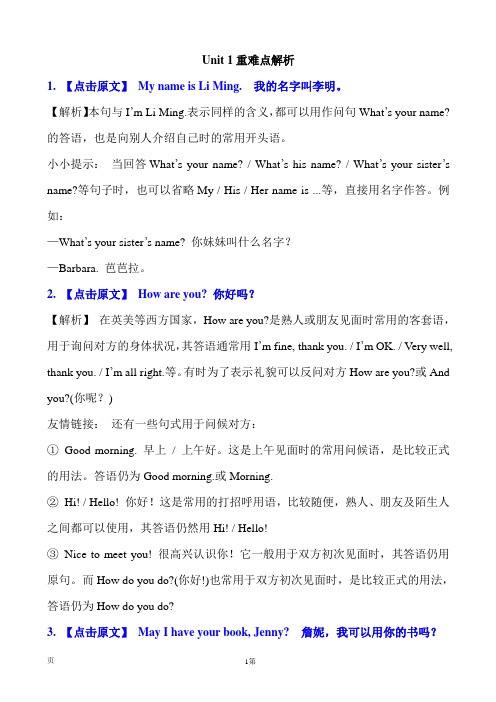
Unit 1重难点解析1. 【点击原文】My name is Li Ming. 我的名字叫李明。
【解析】本句与I’m Li Ming.表示同样的含义,都可以用作问句What’s your name?的答语,也是向别人介绍自己时的常用开头语。
小小提示:当回答What’s your name? / What’s his name? / What’s your sister’s name?等句子时,也可以省略My / His / Her name is ...等,直接用名字作答。
例如:—What’s your sister’s name? 你妹妹叫什么名字?—Barbara. 芭芭拉。
2. 【点击原文】How are you? 你好吗?【解析】在英美等西方国家,How are you?是熟人或朋友见面时常用的客套语,用于询问对方的身体状况,其答语通常用I’m fine, thank you. / I’m OK. / Very well, thank you. / I’m all right.等。
有时为了表示礼貌可以反问对方How are you?或And you?(你呢?)友情链接:还有一些句式用于问候对方:①Good morning. 早上/ 上午好。
这是上午见面时的常用问候语,是比较正式的用法。
答语仍为Good morning.或Morning.②Hi! / Hello! 你好!这是常用的打招呼用语,比较随便,熟人、朋友及陌生人之间都可以使用,其答语仍然用Hi! / Hello!③Nice to meet you! 很高兴认识你!它一般用于双方初次见面时,其答语仍用原句。
而How do you do?(你好!)也常用于双方初次见面时,是比较正式的用法,答语仍为How do you do?3. 【点击原文】May I have your book, Jenny? 詹妮,我可以用你的书吗?【解析】may是情态动词,意为“可以”,其后接动词原形。
Unit 1 要点解析
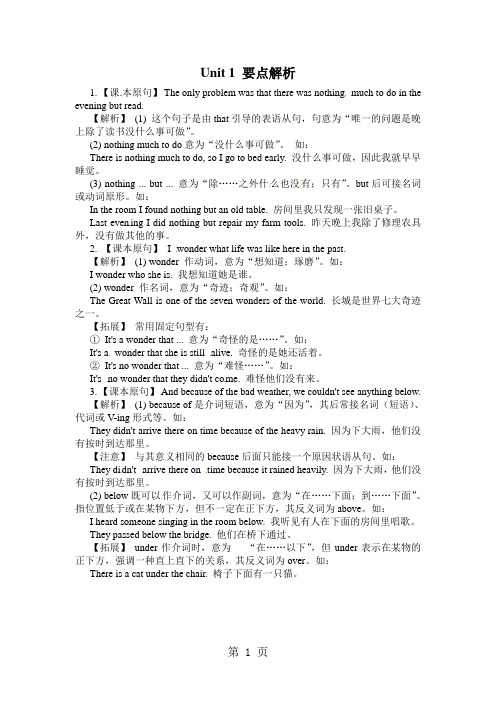
Unit 1 要点解析1. 【课本原句】The only problem was that there was nothing much to do in the evening but read.【解析】(1) 这个句子是由that引导的表语从句,句意为“唯一的问题是晚上除了读书没什么事可做”。
(2) nothing much to do意为“没什么事可做”。
如:There is nothing much to do, so I go to bed early. 没什么事可做,因此我就早早睡觉。
(3) nothing ... but ... 意为“除……之外什么也没有;只有”。
but后可接名词或动词原形。
如:In the room I found nothing but an old table. 房间里我只发现一张旧桌子。
Last even ing I did nothing but repair my farm tools. 昨天晚上我除了修理农具外,没有做其他的事。
2. 【课本原句】I wonder what life was like here in the past.【解析】(1) wonder 作动词,意为“想知道;琢磨”。
如:I wonder who she is. 我想知道她是谁。
(2) wonder 作名词,意为“奇迹;奇观”。
如:The Great Wall is one of the seven wonders of the world. 长城是世界七大奇迹之一。
【拓展】常用固定句型有:①It's a wonder that ... 意为“奇怪的是……”。
如:It's a wonder that she is still alive. 奇怪的是她还活着。
②It's no wonder that ... 意为“难怪……”。
如:It's no wonder that they didn't co me. 难怪他们没有来。
新目标英语八年级上Unit 1重难点解析

1.【原句】How often do y ou exercise?【讲解】how often意为“多久一次”,用于提问动作发生的频度,常用频度副词al-ways,sometimes,hardly,never及一些表示频度的短语every day,once a week等作答语。
【真题】—______is Lucky52Show on CCTV-2?—Once a week.(2006湖北省黄冈市)A.How longB.How oftenC.How many timesD.How soon【点拨】选B。
答语“每周(一次)”表示动作发生的频度,A、C、D项分别意为“多长时间”、“多少次”、“(再过)多久”,所以只有“多久(一次)”与答语相吻合。
2.【原句】She often goes to the movies.【讲解】often是表示频度的副词,这类词按频度大小排列如下:always,usually, often,sometimes,hardly ever,never,它们通常位于行为动词之前,be动词、情态动词和助动词之后,但often被quite,rather等表程度的副词修饰时,也可以位于句末。
例如: She didn’t come to see me quite often.【真题】—Do you______hold such parties?—Yes.Every Saturday evening.(2006山东省东营市)A.alwaysuallyC.oftenD.hardly【点拨】选C。
A、D项分别意为“总是”、“几乎不”,这在意义上与答语“每周六晚”相矛盾,应先排除掉。
usually意为“通常”,比often表示的频率更频繁,问句中的“这样的”表明此种聚会有别于一般常见的聚会,故从问话者的角度来讲,其发生的频率应当略低一些,所以选C。
3.【原句】Is her lifestyle the same as yours or different?【讲解】本句中的same是代词,指代the same thing,the same as意为“和……一样”,后接代词或名词。
最新人教版七上Unit1重难点总结+练习
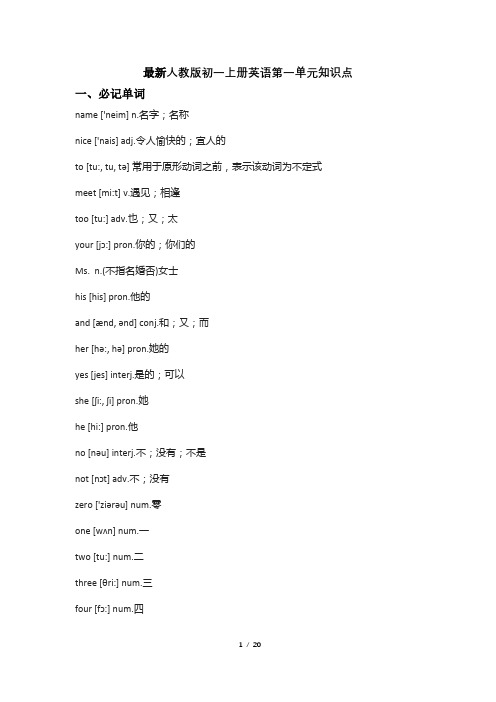
最新人教版初一上册英语第一单元知识点一、必记单词name ['neim] n.名字;名称nice ['nais] adj.令人愉快的;宜人的to [tu:, tu, tə] 常用于原形动词之前,表示该动词为不定式meet [mi:t] v.遇见;相逢too [tu:] adv.也;又;太your [jɔ:] pron.你的;你们的Ms. n.(不指名婚否)女士his [his] pron.他的and [ænd, ənd] conj.和;又;而her [hə:, hə] pron.她的yes [jes] interj.是的;可以she [ʃi:, ʃi] pron.她he [hi:] pron.他no [nəu] interj.不;没有;不是not [nɔt] adv.不;没有zero ['ziərəu] num.零one [wʌn] num.一two [tu:] num.二three [θri:] num.三four [fɔ:] num.四five [faiv] num.五six [siks] num.六seven ['seven] num.七eight [eit] num.八nine [nain] num.九telephone ['telifəun] n.电话;电话机number ['nʌmbə] n.号码;数字phone [fəun] n.电话telephone/phone number 电话号码first [fə:st] adj.第一first name n.名字last [lɑ:st] adj.最后的;末尾的last name 姓friend [frend] n.朋友China ['tʃainə] 中国middle ['midl] adj.中间的n.中间school [sku:l] n.学校middle school 中学;初中二、必备短语1. my name 我的名字My name is Mary. 我叫玛丽。
Unit 1 课文知识讲解(重点短语 句子解析)2024-2025学年新外研版七年级英语上册

外研版七年级上册新教材(讲义)Unit 1 A new start重点短语on the blackboard 在黑板上write down 记下start to do 开始做the first 第一个point out 指出...in the first lesson 在第一节课jump into my mind 跳进我的脑海look up at 抬头看think about 思考,想想看put up my hand 举起手来There is a mistake. 有一个错误。
Confucius 孔子Mencius 孟子well done 做得不错in fact 事实上all of you 你们所有人junior high school 初中more difficult 难度更大It’s important to do做某事这是很重要的the main idea of the passage 该文章的中心思想learn from 向…学习make mistakes 犯错it’s important for sb. to do sth.某人做事很重要。
come into 进入ask sb. to do sth 要求某人做些什么how about …怎么样fell so nervous 非常紧张地gave a silly answer 给出了一个愚蠢的答案turn red 变红with a smile 微笑着(脸上带着)make sb.+ adj. 让某人怎么样了the students' union 学生联合会at school 在学校all kinds of activities 各种活动such as 比如cultural festivals 文化节日sports meets 体育比赛sometimes 有时need to 需要describe our problems 描述我们的问题state our problems 说明我们的问题for example 例如It's hard to do sth. 这是很困难的去做......give sb. some advice 给某人一些建议the first 最先a piece of advice 一条建议the second 第二个look at 看look up 向上看/ 查阅(字典)by yourself 单独地、靠你自己problem 问题try your best 尽你所能work hard 努力工作read the passage 标题的含义find out 发现the meaning of the title 读这篇文章Do you remember...? 你还记得......吗?your sixth birthday 你的六岁生日made a paper boat 做了一艘纸船in the pool 在池中sail away 远航look at 查看It's a letter from sb. 这是某人的一封信。
外研版英语八上Unit1课文重难点

Ⅱ 完成句子 1.他住得离邮局最远。
He lives _th_e_ f_a_r_t_h_e_st_ _f_r_o_m__ the post office. 2. 这是到校的最好方式。
It’s t_h_e__b_es_t__w_a_y__ to get to school. 3.我住得离学校最近。
I live _th_e_ _c_l_o_se_s_t__ _t_o_ school.
Eg. I can answer all the questions except for the last one. 除了最后一题外,所有题目我都可以解答。
2. Maybe I should go to school by taxi. 或许我应该乘出租车上学。
(1)maybe “或许;可能”, 副词,在句中作状语, 相当于perhaps,常位于句首。 Eg. Maybe she’ll come this afternoon.
Unit 1 He lives the farthest from school.
课文重难点
New words study
road accident except far
far from crowded
n. 路;(尤指)公路 n. 交通事故;意外事件 prep. 除……之外 adj. 远的;遥远的 adv. 远;遥远
Everyday English
• What happened?
怎么了?出什么事了?
= What’s wrong? / What’s the matter?
• Don’t worry.
别担心。
Grammar
你能自己总结出最高级的构成形式吗?
fast→fastest safe→safest big→biggest
人教版英语七年级上册重、难点剖析(Unit1)

初中英语学习材料madeofjingetieji新目标英语七年级上册重、难点剖析(Unit 1) 1.—My name My name’’s Jenny. 我叫詹妮。
我叫詹妮。
—I’I’m Gina. Nice to meet you. (P1) m Gina. Nice to meet you. (P1) 我是吉娜,很高兴见到你。
我是吉娜,很高兴见到你。
1) My name is 1) My name is……意为“我的名字是……”,是介绍自己名字的正规用语。
My name name’’s 是My name is 的缩写形式。
注意:初次见面时,自我介绍是社交礼貌,一般先介绍自己的名字。
如:一般先介绍自己的名字。
如:—My name is Tony. 我的名字叫托尼。
我的名字叫托尼。
—My name is Linda. Nice to meet you. 见到你我很见到你我很 高兴。
高兴。
My name is My name is……也可以说I am I am……,可缩写成I’I’m m …,要显得随意,非正式些。
,要显得随意,非正式些。
2) 当两个人在某地初次见面时,常用Nice to meet you. 来表示问候,此句型等于It It’’s nice to meet you. 其答语应为:Nice to meet you, too. 如:如: —Hello, Nick. Nice to meet you!你好,尼克。
见到你很高兴! —Hello, Jack. Nice to meet you too! 你好,杰克。
见到你我也很高兴1 类似的说法还有:类似的说法还有:Nice to see you!Glad to meet (see) you!I’I’m glad to meet (see) you m glad to meet (see) you Good to see you here.2.—What What’’s your name? 你叫什么名字?你叫什么名字?—Alan. (P1) 艾伦。
- 1、下载文档前请自行甄别文档内容的完整性,平台不提供额外的编辑、内容补充、找答案等附加服务。
- 2、"仅部分预览"的文档,不可在线预览部分如存在完整性等问题,可反馈申请退款(可完整预览的文档不适用该条件!)。
- 3、如文档侵犯您的权益,请联系客服反馈,我们会尽快为您处理(人工客服工作时间:9:00-18:30)。
Have a try
1. We have planted flowers and green trees around the buildings, which___ the beauty of the city. A. add to B. add up C. add up to D. are added to
Exchange your ideas in pairs: A: What are your parents / you concerned about? B: ____________1)单项填空 The meeting was concerned _____ reforms and everyone was concerned _______their own interests( 利 益 ).
拓展: set… free 释放某人 set about (doing) sth. 着手做某事 set out 出发;着手干(to do sth.) set off 动身(for…);引爆 set up 建立,创立 (机构,组织,公司)
Practice 3
1. They___________the experiment yesterday. A. set about to do B. set out doing C. set off doing D. set out to do 2. The Chinese Olympic delegation group will__________for America tomorrow. A. set up B.set off C. set out D. set about
4. I wonder if it’s because I haven’t been able to be outdoors for so long that I’ve grown so crazy about everything to do with nature.
结构分析:本句是一个复杂句,I wonder是主句的 主语和谓语,if引导一个宾语从句,在宾语从句中 because引导一个原因状语从句,且用了“It is/ was +被强调部分+that/ who +其它”这个强调结构,强 调原因状语从句。运用该强调结构需知以下两点:
3. set down=? 拓展:短语竞猜 eg: (1)The English set a lot of doves(鸽子) free in the Olympic Games. (2) We set about joining in the military training (军训)last Monday and fininshed off on Friday. (3) We set out to join in the military training (军 训)last Monday and fininshed off on Friday. (4)The Chinese Olympic delegation group will set off for Beijing from London tomorrow. (5) Steve Jobs set up his own company after dropping out of Reed College.
2 Eg:(1)The experts are concerned about the growth of the world’s population. (2) As far as I am concerned, the price of oil will continue to increase. (3)These problems concern all of us. (4) The old man is often concerned with social welfare. (5) She showed great concern about you.
Unit 1 Friendship
重难点复习拓展
1.
add… up… 把…加起来 add up to 加起来总和是 add to 增加,增添 add A to B 将A加到B上
eg. Add your scores up and we’ll see who won. These numbers add up to 100. Will you please add some milk to my coffee? These trees on the road add to the beauty of our city
高手过招 (1)单项填空 ①It's the third time late this week. A. that you are B. you are C. when you arrived D. that you have been ②It was for the first time that he to the party. A. invited B. had been invited C. has been invited D. was invited
除谓语动词 (1)此句型常用来强调( )外的句子成分。 (2)此句中的that是固定的, 即使被强调部分是时间 或地点,也用that; 但强调( 人物 )时也可用who。
3)判别下面的句子。 It was three o’clock when I got home. 我到家的时候三点。 It was at three o’clock that I got home. (强调句) 三点钟我到的家。 It was in his town that he was brought up. (强调句) 他是在镇上被养大的。 It was this town where/in which he was brought up. 这是他被抚养长大的城镇。 (定语从句)
6. I am having some trouble with my classmates at the moment. have trouble with + n. 因…苦恼; 同…闹纠纷 He had trouble with the first paragraph and began to read it through a second time. 第一段他读不懂,因此又看了第二遍。 拓展: have trouble (in) doing sth 做某事有困难 类似用法: have problems/ difficulty with….. 在… 有困难 have problems/ difficulty (in) doing sth 做某事 有困难
以上句型中,difficulty/ trouble/problem前可根据情况加some, any, little, few, much, a lot of, no等词修饰
对应训练 in My deskmate has some trouble ___ spelling some of the words in American English while I with have some difficulty ___ pronunciation.
5. It was the first time in a year and a half that I had seen the night face to face.
句型提炼:
It is the first time that sb has/have done... It was the first time that sb had done... 这是某人第一次做…. (1)其中的it可用this或that替代; (2)first根据实际情况可改为second, third…等
Her classmates’ laughter only added to
(= increased) her embarrassment(尴尬).
对应训练
Add 1)______ some milk and to sugar _____ coffee before drinking it. added up 2) When we _______ all the costs, we realized we had spent too much. added up to 3) His whole school education ___________ no more than ten years.
2. concern vt. (使)担忧;涉及;关系到 n. 担心;关心, 关注;(利害)关系 Phrase:
关心,挂念 be concerned about/over/for adj.be concerned with/in 牵扯进/参与„„ as/so far as...be concerned 就„„而言 担忧/关心„„ concern oneself about/for vt.concern oneself with 从事,参与„„ concern sb. /sth. 与„„有关
(4)英语中常用助动词do, does或did强调谓语。 结构为: “do(does/ did)+动词原形…”,意为 “确实/务必…” He did go to the airport yesterday, but he didn’t find you. 他昨天确实去了机场,但他没有找到你。
■运用:用it is/was…that…强调下句中的划线部。 Jack broke a glass yesterday afternoon at his uncle’s home. It was Jack that / who (1) _________________________broke a glass yesterday afternoon at his uncle’s home.(强调主语) It was a glass that (2) _______________________Jack broke yesterday afternoon at his uncle’s home.(强调宾语) It was yesterday afternoon that (3) _____________________________________Jack broke a glass at his uncle’s home.(强调时间状语) It was at his uncle’s home that (4) __________________________________Jack broke a glass yesterday afternoon. (强调地点状语) did break (5) Jack______ a glass yesterday afternoon at his uncle’s home
